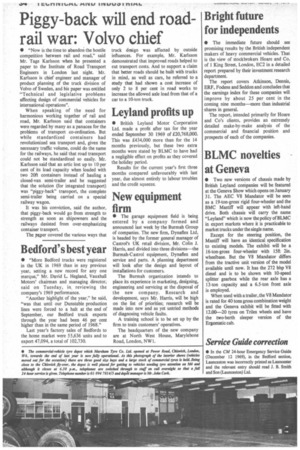Piggy-back will end road rail war: Volvo chief
Page 36

If you've noticed an error in this article please click here to report it so we can fix it.
• "Now is the time to abandon the hostile competition between rail and road," said Mr. Tage Karlsson when he presented a paper to the Institute of Road Transport Engineers in London last night. Mr. Karlsson is chief engineer and manager of product planning of the truck division of Volvo of Sweden. and his paper was entitled "Technical and legislative problems affecting design of commercial vehicles for international operations".
When speaking of the need for harmonious working together of rail and road, Mr. Karlsson said that containers were regarded by many as a panacea for the problems of transport co-ordination. But while standardized containers had revolutionized sea transport and, given the necessary traffic volume, could do the same for the railways, he said that road transport could not be standardized so easily. Mr. Karlsson said that an artic lost up to 10 per cent of its load capacity when loaded with two 20ft containers instead of hauling a closed-van semi-trailer and he suggested that the solution (for integrated transport) was "piggy-back" transport, the complete semi-trailer being carried on a special railway wagon.
It was his conviction, said the author, that piggy-back would go from strength to strength as soon as shipowners and the railways desisted from over-emphasizing container transport.
The paper covered the various ways that truck rhmign was affected by outside influences. For example, Mr. Karlsson demonstrated that improved roads helped to cut transport costs. And to support a claim that better roads should be built with trucks in mind, as well as cars, he referred to a study that had shown a cost increase of only 2 to 8 per cent in road works to increase the allowed axle load from that of a car to a 10-ton truck.
































































































